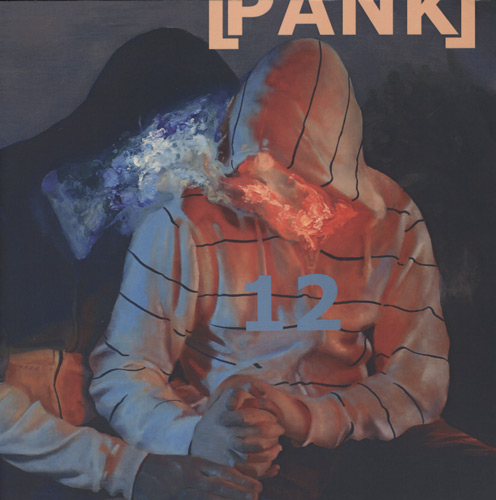PANK – 2017
PANK publishes work that plays with form and expectations to confound readers with possibility.
PANK publishes work that plays with form and expectations to confound readers with possibility.
Laurie Blauner’s piece “I am an Animal” combines prose and lists to encompass the narrator’s period of mourning after a beloved cat dies. Told in five separately titled pieces, Blauner’s work is a conglomeration of personal anecdotes, facts (complete with brief parenthetical citations), and her lists. In the first piece, she has two parallel lists: Animal and Human. She surrounds herself in empathy for all creatures with the understanding that at the end of her Human list, “I wasn’t always like this.” She could just as easily have been born a fish, a parrot, a rabbit or an animal under genetic experimentation. Her piece is devastating with grief, bizarre, and frightening. Always, Blauner remains open to possibilities about her existence and relationship to other creatures.
“As She Melted” by Jennifer Fliss also combines prose with another form of writing: this time check-the-box brief questionnaires pepper the story. In this speculative fiction piece Fliss introduces us to Marla, a woman who is melting into water on her kitchen floor. But the conflict stems not from Marla melting rather from what Marla’s abusive husband, Brent, will say about Marla melting. Fliss renders abuse through her questionnaire: “What is the first thing Brent says? / ‘Marla!? Marla, what the fuck? The mail was all over the driveway.’” one of three possible answers. Fliss ventures into speculative fiction and unknowable outcomes that cannot be defined by checking a box.
Phong Nguyen renders his piece, “Senior Paper: On Emily Dickinson’s ‘Because I Could Not Stop for Death’ by Micah Lipshitz” through the framing device of a high school student writing her English paper. Nguyen sprinkles his piece with a thesis statement, quotes and a poorly constructed argument. The real purpose of Micah’s essay is not about Dickinson at all, but a letter to her teacher about the poltergeist in her house. Capturing the voice of a misfit teenager, Nguyen’s protagonist has no qualms revealing in her paper that “When I looked up all those words for this essay, it was late and night” or that “I am writing to you, Mr. Haley, hoping that you can provide some perspective on what’s happening.” Every sentence shows mastery of how to develop a character in a non-traditional story.
Neither prose nor poetry, JL Bogenschneider’s piece “Reading Group Questions & Topics for Discussion” is just that: a list of discussion questions a reader might find at the end of a book. Bogenschneider’s form creates a narratorial voice, someone with bite to their words. The narrator asks, “4: The story is generally told in a realist mode, but uses elements of the fantastical in order to advance the plot. Did you even get that?” The emotions of the narrator manifest in a search for answers and opening up a discussion about why we read. “15b ii) [ . . . ] does the act of reading—to you—have any value beyond the entertaining and the immediate?” Powerful and thought-provoking in both form and content, Bogenschneider’s experimentation pays off: you will want to discuss this piece.
Pamela Hughes plays with reader expectations in her poem “Vote Bush.” Political satire at its finest, Hughes dedicates her poem to George W., then teases out the metaphor of her vagina as president. She discusses topics ranging from women’s choices, to racism and war. As she explains, “Peace would not need a super absorbent / tampon to stop all the bleeding.” Funny, poignant, and unafraid to make waves with her language, Hughes brings playfulness to her poetry.
“Earth’s Axis” by Kirsten Shu-Ying Chen also invokes a playful narrator. Chen’s narrator plays with her understanding of self through literally playing with language. While editing a proposal, the narrator discovers, “I’m a conjunction. An ampersand [ . . . ] A disorienting inkblot / tangled in its own orbit that shoots off / into zero gravity before ending very abruptly.” The reflection is fun, visible, and brings motion to the poem. The background reveals the narrator had been in mourning, becoming a strong contrast to the otherwise lighthearted piece. This narrator revels in breaking the rules and expectations.
PANK mixes forms and genres and everything in between. These pieces make our language feel new and create delight in reading. Playful and experimental with language, PANK is a journal where anything is possible.
[www.pankmagazine.com]





